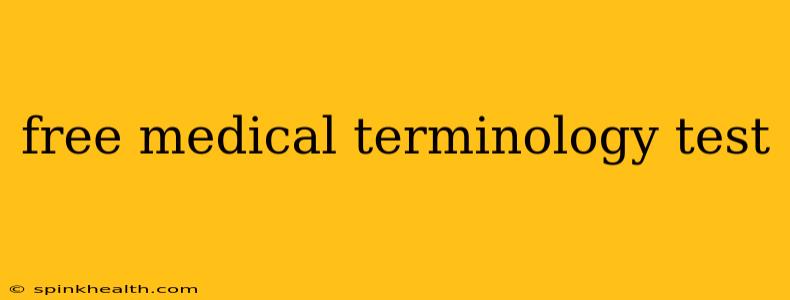So, you're looking to test your medical terminology knowledge? Perhaps you're a student prepping for exams, a medical professional brushing up on your skills, or maybe you're even interviewing for a healthcare position. Whatever the reason, understanding medical terminology is crucial in today's world. This isn't just about memorizing long words; it's about understanding the language of healthcare, which directly impacts patient care and overall efficiency.
This post isn't just about providing a quick "free medical terminology test" – though we will get to that! – it's about guiding you on your journey towards medical terminology mastery. Think of it as your personal study guide and confidence booster, all rolled into one.
Where to Find a Free Medical Terminology Test
Let's tackle the headline first. Finding a genuinely good free medical terminology test online can be trickier than it seems. Many free tests are short, simplistic, or lack the comprehensive feedback crucial for learning. However, several reputable websites offer practice quizzes and tests that can be valuable learning tools. You’ll find these often integrated into larger resources or educational platforms that offer more in-depth learning if you choose to continue your studies. Searching for terms like "medical terminology practice quiz" or "medical terminology flashcards" will turn up several options. Remember to check the source’s credibility before relying on any single test for assessment.
What are the Main Components of Medical Terminology?
Understanding the building blocks of medical terms is key to mastering the language. Medical terminology isn't random; it's built upon prefixes, suffixes, and root words.
- Root Words: These are the foundation, often indicating the body part or condition involved (e.g., cardi for heart, hepat for liver).
- Prefixes: These come at the beginning and modify the meaning (e.g., hyper- meaning excessive, hypo- meaning deficient).
- Suffixes: These are added to the end and often indicate a procedure, condition, or state (e.g., -itis meaning inflammation, -ectomy meaning surgical removal).
By learning these components, you can decipher many unfamiliar medical terms. For example, "hepatitis" combines the root word "hepat" (liver) with the suffix "-itis" (inflammation), clearly indicating liver inflammation.
How Can I Improve My Medical Terminology Skills?
Mastering medical terminology isn't a sprint; it's a marathon. Consistent effort and strategic learning are vital.
- Flashcards: Use flashcards (physical or digital) to memorize prefixes, suffixes, and root words. Quiz yourself regularly.
- Practice Tests: Regularly taking practice tests, even if they aren't graded, will solidify your understanding and identify areas needing improvement.
- Medical Textbooks and Dictionaries: Use reputable medical dictionaries and textbooks to learn in depth about specific terms and their contexts. Don't just memorize definitions; try to understand the underlying concepts.
- Real-World Application: If possible, apply what you're learning in a practical setting. Whether it's shadowing a medical professional or volunteering in a healthcare environment, hands-on experience solidifies your knowledge.
What are Some Common Medical Abbreviations?
Medical professionals frequently use abbreviations to save time and space. Familiarizing yourself with common ones is essential. Some examples include:
- BP: Blood Pressure
- ECG/EKG: Electrocardiogram
- IV: Intravenous
- Rx: Prescription
- Dx: Diagnosis
Are there any online resources besides free medical terminology tests?
Absolutely! Numerous online resources provide comprehensive medical terminology courses, interactive exercises, and quizzes. Many educational websites and platforms offer free introductory materials, and some even offer paid, more in-depth courses. Explore different options to find a learning style that suits you best. Remember that consistent practice and a multi-faceted approach are key to success.
Conclusion
While a free medical terminology test can be a helpful tool, it's just one piece of the puzzle. A comprehensive understanding of prefixes, suffixes, root words, and common abbreviations, coupled with consistent practice and the use of various learning resources, will ultimately lead to medical terminology mastery. Good luck on your journey!

